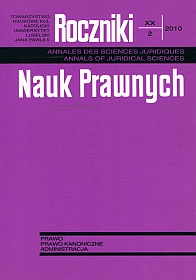Legal Aspects of Functioning of a Family in the British Colonies in North America. Commencement to the Further Studies
Abstract
The aim of the article is to present selected issues concerning legal aspects of functioning of a family in the British colonies in North America till 18th century. During that time, family law was under the influence of common law. The article provides an analyze of the most distinctive features of family status. As an introduction, authors highlight the problem of legal capacity and its limits. The issue of slavery and servants are also considered. The authors continue with a description of the ways of contracting a marriage. Common law influenced this area, which was not fully regulated by colonial documents. Hence, a mixed type of the procedural way to get married was the most popular. Moreover, there was not one unified age which allowed to marry. What is also interesting, is the fact that because of the lack of women, different ways of joining couples have arisen. Authors discuss also the colonial model of family which was generally patriarchal and hierarchical. There was also the institution of a master of family and selectmen whose main role was to protect normal functioning of a family.
Furthermore, the article is also concerned with penal sanctions for violation of the good and peace of the family e.g. adultery and disobedience towards parents. In this area, a vide range of severe punishments was introduced, especially in New England which was under the influence of Puritans. However, children also had a right to compensation from parents, when they treated them extremely severely or refused to agree to marriage. Final remarks are about statutory and testamentary succession as well as a special status of widow in New York Charter of Liberties and Privileges. In order to present a vivid analysis and interesting distinctions, many source documents have been quoted in this article, e.g. from Louisiana, Massachusetts, Virginia, New Hampshire, Rhode Island and Pennsylvania.
Copyright (c) 2010 Roczniki Nauk Prawnych

This work is licensed under a Creative Commons Attribution-NonCommercial-NoDerivatives 4.0 International License.


